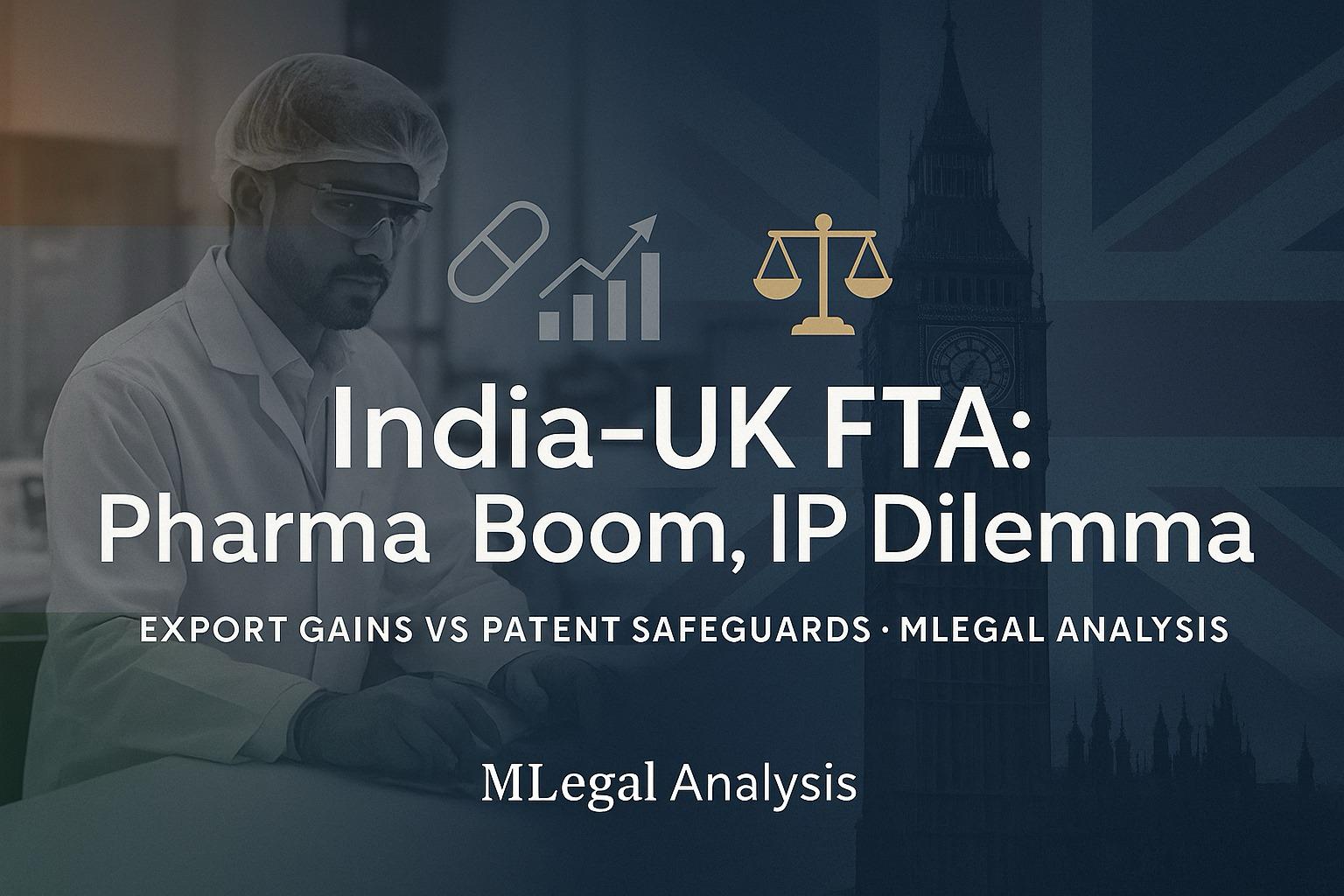India–UK FTA and Pharma IP: Strategic Growth or Silent Concessions?
The recently concluded India–UK Free Trade Agreement (FTA) marks a significant milestone in bilateral trade relations, particularly for the Indian pharmaceutical sector. While the deal promises duty-free access to 99% of Indian pharma exports to the UK, legal experts caution that beneath the surface, it may subtly recalibrate India’s robust intellectual property (IP) framework.
At MLegal, we are closely tracking the FTA’s implications for our clients in the pharmaceutical, healthcare, and intellectual property sectors, as the treaty opens new export opportunities but also raises questions about long-term regulatory sovereignty and access to affordable medicines.
Trade Opportunity: Boost for India’s Generics Sector
The UK’s zero-tariff concession under the FTA is a win for India’s USD 25 billion generic pharmaceutical industry, which already accounts for nearly half of the world’s supply of generic medicines. The agreement does not mandate data exclusivity or patent term extensions, preserving India’s right to limit patent monopolies to the statutory 20-year term.
Section 3(d) of India’s Patents Act, 1970—a critical public health safeguard preventing evergreening through minor drug modifications—remains intact. This legal safeguard ensures that only medicines with demonstrably enhanced therapeutic efficacy qualify for new patents.
Compulsory Licensing: Preserved but Softened?
While the FTA affirms each country’s right to adopt public health measures and issue compulsory licences under the TRIPS Agreement and Doha Declaration, it also elevates voluntary licensing as the preferred mechanism.
This preference, though not legally binding, may soften India’s stance on using compulsory licensing—a key policy tool during national health emergencies. Voluntary licences are often subject to restrictive conditions (e.g., supply caps, territorial limits, pricing constraints), potentially limiting widespread access to affordable treatments.
Our legal position: The FTA’s language does not restrict compulsory licensing, but the structural emphasis on voluntary mechanisms may influence future government policy and judicial interpretation.
Patent Working and Disclosure: Transparency at Risk?
Under the FTA, the obligation for patent holders to file annual working statements has been diluted. Now, disclosures may occur once every three years, limiting public oversight and potentially making it harder for authorities or generics to challenge non-working patents.
Though the agreement mandates the sharing of prior art and examination reports, it omits requirements to disclose divisional applications or continuation-in-part filings—key tools to identify patent thickets.
mplication: This shift could hinder the transparency needed to combat frivolous patenting and extend market monopolies beyond original patent terms.
TRIPS-Plus by Design, Not Declaration
While the FTA avoids overt TRIPS-plus obligations, such as automatic patent linkage or patent term restoration, its promotion of regulatory cooperation and technical harmonisation may gradually shift India’s IP framework toward higher protection standards.
Legal experts call this a “soft TRIPS-plus shift”—not by legislation, but by procedural alignment, economic pressures, and sustained bilateral engagement.
IP Working Group: Dialogue or Direction?
The treaty establishes a bilateral Working Group on Intellectual Property, composed of government representatives from both nations. This forum is expected to review implementation, promote cooperation, and resolve disputes.
However, industry watchers warn that unless guardrails are established, this forum could serve as a vehicle to align India’s IP standards with international commercial interests, undermining its public health priorities.
Conclusion: Strategic Gains, Subtle Trade-Offs
The India–UK FTA offers substantial export incentives for Indian pharma while preserving statutory flexibilities in patent law. However, procedural shifts, regulatory nudges, and soft power diplomacy embedded within the agreement merit close observation.
At MLegal, our international trade and intellectual property experts are well-equipped to guide clients through the emerging compliance landscape, protect their IP rights, and advise on compulsory and voluntary licensing structures.



